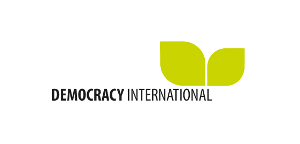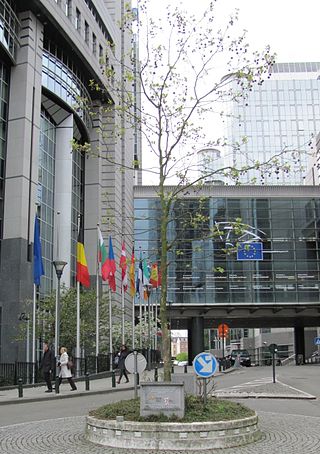Related Research Articles
In politics, lobbying, is the act of lawfully attempting to influence the actions, policies, or decisions of government officials, most often legislators or members of regulatory agencies, but also judges of the judiciary. Lobbying, which usually involves direct, face-to-face contact in cooperation with support staff that may not meet directly face-to-face, is done by many types of people, associations and organized groups, including individuals on a personal level in their capacity as private citizens, it is also practiced by corporations in the private sector serving their own interests, by non-profits and non-governmental organizations in the voluntary sector, by fellow legislators or government officials influencing each other through legislative affairs in the public sector, and by advocacy groups. It is also an industry known by many of the aforementioned names, and has a near complete overlap with the public affairs industry. Lobbyists may be among a legislator's constituencies, for example amateur lobbyists such as a voter or a bloc of voters within their electoral district acting as private citizens; while others like professional lobbyists may engage in lobbying as a business or profession. Professional lobbyists are people whose business is trying to influence legislation, regulation, or other government decisions, actions, or policies on behalf of a group or individual who hires them. Individuals and nonprofit organizations can also lobby as an act of volunteering or as a small part of their normal job. Governments often define "lobbying" for legal purposes, and regulate organized group lobbying that has become influential.
Astroturfing is the practice of hiding the sponsors of a message or organization to make it appear as though it originates from and is supported by grassroots participants. It is a practice intended to give the statements or organizations credibility by withholding information about the source's financial backers. The term astroturfing is derived from AstroTurf, a brand of synthetic carpeting designed to resemble natural grass, as a play on the word "grassroots". The implication behind the use of the term is that instead of a "true" or "natural" grassroots effort behind the activity in question, there is a "fake" or "artificial" appearance of support.

Lobbying in the United States describes paid activity in which special interest groups hire well-connected professional advocates, often lawyers, to argue for specific legislation in decision-making bodies such as the United States Congress. It is a highly controversial phenomenon, often seen in a negative light by journalists and the American public, with some critics describing it as a legal form of bribery, influence peddling, and/or extortion. While lobbying is subject to extensive and often complex rules which, if not followed, can lead to penalties including jail, the activity of lobbying has been interpreted by court rulings as constitutionally protected free speech and a way to petition the government for the redress of grievances, two of the freedoms protected by the First Amendment of the Constitution. Since the 1970s, lobbying activity has grown immensely in the United States in terms of the numbers of lobbyists and the size of lobbying budgets, and has become the focus of much criticism of American governance.

The TaxPayers' Alliance (TPA) is a pressure group in the United Kingdom which was formed in 2004 to campaign for a low-tax society. The group had about 18,000 registered supporters as of 2008 and claimed to have 55,000 by September 2010. However, it has been suggested that a vast majority of these supporters – who do not contribute financially or engage in campaigning – were simply signed up to a mailing list.
Fredric Michael "Fred" Wertheimer is an American attorney, lobbyist, and activist notable for his work on campaign finance reform and other government integrity, transparency, and accountability issues.

The fossil fuels lobby includes paid representatives of corporations involved in the fossil fuel industry, as well as related industries like chemicals, plastics, aviation and other transportation. Because of their wealth and the importance of energy, transport and chemical industries to local, national and international economies, these lobbies have the capacity and money to attempt to have outsized influence governmental policy. In particular, the lobbies have been known to obstruct policy related to environmental protection, environmental health and climate action.

Unlock Democracy is a British pressure group, based in London. The organisation campaigns for a more participatory democracy in Britain, founded upon a written constitution. Unlock Democracy works to promote democratic reform across the political spectrum and is not aligned with any political party. The organisation's activities include producing a range of publications, lobbying politicians and political parties and working on projects to promote greater public involvement in politics, at both local and national levels.
The Corporate Europe Observatory (CEO) is a non-profit research and campaign group whose declared aim is to "expose any effects of corporate lobbying on EU policy making". It is based in Brussels.
Lobbying in the United Kingdom plays a significant role in the formation of legislation and a wide variety of commercial organisations, lobby groups "lobby" for particular policies and decisions by Parliament and other political organs at national, regional and local levels.
Quiller Consultants is a British lobbying and public relations firm based in Westminster in central London that has close links to the Conservative party.
The Czech Pirate Party or Pirates is a liberal progressive political party in the Czech Republic, founded in 2009. The party was founded as a student-driven grassroots movement campaigning for political transparency, civil rights and direct democracy.
Friends of the Earth Europe (FoEE) is the European branch of the world's largest grassroots environmental network, Friends of the Earth International (FOEI). It includes 33 national organizations and thousands of local groups.
The UK Public Affairs Council (UKPAC) was a United Kingdom organisation enabling self-regulation of individuals engaged in UK lobbying activities.

The Transparency of Lobbying, Non-party Campaigning and Trade Union Administration Act 2014 is an Act of Parliament in the United Kingdom introduced in July 2013. The bill was sponsored by the Cabinet Office and the Department for Business, Innovation and Skills (BIS). It was often referred to as "The Lobbying Bill" for short. It passed all parliamentary stages, and received royal assent on 30 January 2014.
A Lobby Registry, also named Lobbyist Registry, Register for Lobby Transparency or Registry of Lobbyists is a public database, in which information about lobbying actors and key data about their actions can be accessed.
Westbourne Communications is a public relations firm founded by James Bethell, 5th Baron Bethell. In June of 2018, the company was sold to Cicero Communications.

Democracy International e.V. is an international non-governmental organisation (NGO) working on strengthening direct democracy and citizens' participation at local level, in the nation states and on the global level. Democracy International has been existing as a loose network of democracy activists since 2002. The organisation was formally established in June 2011 as a registered membership association according to German non-profit law. Democracy International is politically independent and funded by membership fees and individual donations. The headquarters are in Cologne, Germany.

Lobbying in the European Union, also referred to officially as European interest representation, is the activity of representatives of diverse interest groups or lobbies who attempt to influence the executive and legislative authorities of the European Union through public relations or public affairs work. The Treaty of Lisbon introduced a new dimension of lobbying at the European level that is different from most national lobbying. At the national level, lobbying is more a matter of personal and informal relations between the officials of national authorities, but lobbying at the European Union level is increasingly a part of the political decision-making process and thus part of the legislative process. 'European interest representation' is part of a new participatory democracy within the European Union. The first step towards specialised regulation of lobbying in the European Union was a Written Question tabled by Alman Metten, in 1989. In 1991, Marc Galle, Chairman of the Committee on the Rules of Procedure, the Verification of Credentials and Immunities, was appointed to submit proposals for a Code of conduct and a register of lobbyists. Today lobbying in the European Union is an integral and important part of decision-making in the EU. From year to year lobbying regulation in the EU is constantly improving and the number of lobbyists is increasing.

55 Tufton Street is a four-storey Georgian-era townhouse on historic Tufton Street, in Westminster, London, owned by businessman Richard Smith. Since the 2010s the building has hosted a network of libertarian lobby groups and think tanks related to pro-Brexit, climate science denial and other fossil-fuel lobby groups. Some of the organisations it houses have close connections with those at 57 Tufton Street next door, including the Centre for Policy Studies and CapX.
References
- ↑ "Written evidence submitted by Tamasin Cave, SpinWatch". Political and Constitutional Reform Committee. www.parliament.uk. Retrieved 25 August 2012.
- ↑ "Unlock Democracy: Launch of Alliance for Lobbying Transparency". Politics.co.uk. Retrieved 25 August 2012.
- ↑ Wheeler, Brian (21 March 2010). "Lobbying and British politicians". BBC News. BBC. Retrieved 25 August 2012.
- ↑ "About ALT". ALT. Retrieved 25 August 2012.
- ↑ "Up to 90% of lobbyists shun new transparency register". Lobbying Transparency. ALT. Archived from the original on 10 December 2013. Retrieved 26 August 2012.
- ↑ "Lobbyists' voluntary register is 'riddled with errors'". Lobbying Transparency. ALT. Archived from the original on 15 April 2013. Retrieved 26 August 2012.
- ↑ Mathiason, Nick (9 July 2012). "Finance industry's multimillion-pound lobbying budget revealed". The Guardian. London. Retrieved 25 August 2012.
- ↑ "Sign Up: Open Up Lobbying. Open Up Politics". Unlock Democracy. Archived from the original on 15 May 2012. Retrieved 25 August 2012.